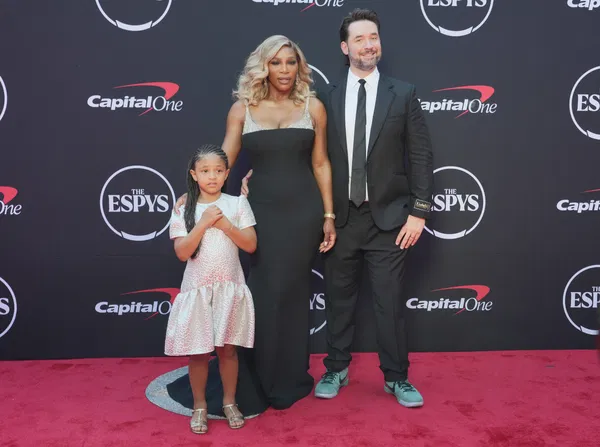
Despite $250 Million Legacy, Serena Williams’ Husband Alexis Ohanian Vows to ‘Do Better’ in Soul-Stirring Message to Daughter Olympia
In the world of high-profile couples, Serena Williams and Alexis Ohanian stand out not only for their combined net worth, estimated to be upwards of $250 million, but also for the fierce dedication they bring to their respective careers and their shared values. Yet, in a recent emotional message to their daughter, Olympia, Ohanian—co-founder of Reddit and a prolific tech investor—openly vowed to “do better” as a father. Given his immense achievements, his public commitment to improvement in fatherhood and family values might come as a surprise to many. The question looms: why would a man with such wealth and influence feel compelled to make such a promise?
Alexis Ohanian’s promise to his daughter might appear admirable, but it highlights a polarizing debate about what really matters in the legacy of high-net-worth families. Critics question whether this public statement reflects genuine introspection or whether it’s an attempt to capture public admiration. In an era of growing income inequality, can the ultra-rich really convince the public that their struggles with “doing better” align with the values of the average family?
The Weight of Wealth on Parenting Values
With substantial financial resources, Ohanian and Williams enjoy an extraordinary degree of freedom when it comes to family life. For many, this kind of wealth means access to the best in healthcare, education, and life experiences for their children. But despite these privileges, Ohanian’s message seemed to underscore that these advantages are not enough to create a fulfilled parent-child relationship.
It begs the question: can the very wealthy ever truly relate to the concerns of the average family, or is this simply another example of wealth isolating people from reality? Critics argue that raising a child in a multimillion-dollar household is worlds apart from the challenges and sacrifices that define the majority of American families. When Ohanian speaks about “doing better” for his daughter, does he risk appearing out of touch with the more systemic struggles of family life?
Public Accountability or Performative Virtue?
Ohanian’s social media presence is known for thoughtful, family-oriented posts, which often shine a positive light on his role as a father and husband. But some detractors see this “soul-stirring” promise as performative—a way to leverage social media’s admiration of fatherhood without the tangible sacrifices that many parents make every day.
There’s no denying that Ohanian and Williams are devoted parents, yet the public statement raises questions about how much these declarations are for Olympia and how much they are for his followers. In an age of hyper-curated personal brands, even a heartfelt pledge can be seen as a tool for public image management. Social media users and fans have increasingly questioned whether wealthy parents making promises to “do better” simply underscores the disconnection between ultra-privileged families and the daily struggles faced by most.
Privilege and the Illusion of Accountability
The essence of Ohanian’s message—to become a better father and provide more for his daughter—resonates with universal values of growth and self-improvement. However, when parenting goals are broadcast by someone with incredible wealth, critics argue, it risks becoming a shallow echo of values many cannot relate to.
For instance, in a family without financial concerns, the drive to “do better” often lacks the tangible constraints that shape the lives of those with fewer resources. If Ohanian decides to dedicate more time to Olympia, he has the freedom to do so. This “freedom to choose” is rarely available to average working parents, many of whom work tirelessly without access to childcare, vacations, or the option to step away from careers.
Legacy Beyond Wealth: Can Money Buy Meaning?
The promise to “do better” takes on a complex meaning when made in the context of wealth and influence. Ohanian and Williams are undoubtedly building a substantial legacy for Olympia. But legacy, critics argue, isn’t simply about a family name or a bank balance; it’s about a set of values. For parents who don’t have vast resources, “doing better” often means making daily sacrifices, balancing multiple responsibilities, and grappling with issues that a $250 million legacy could solve in an instant.
For some observers, Ohanian’s promise to “do better” feels more like a gesture than an actionable pledge. After all, his child will grow up with access to resources most could only dream of, and for many, his desire to “do better” comes off as hollow. In a world where the wealthy can insulate their families from the everyday hardships of society, critics argue that it’s easy to claim values that seem all the more difficult for others to achieve.
The Paradox of “Good Intentions” in a Wealthy Family
Ohanian’s message is stirring, yes, but it underscores a paradox. Wealth gives families choices and privileges that make pledges to “do better” relatively easier to achieve in practice. For many onlookers, it’s difficult to reconcile a message of family values from someone in a life of comfort and privilege. In the eyes of some, it’s simply another example of the privileged pushing a narrative of universal struggles that may not apply to their unique circumstances.
Final Thoughts
Alexis Ohanian’s heartfelt message to his daughter strikes a chord in today’s family-focused, values-oriented social media landscape. Yet, as one of the tech world’s most influential figures, he’s not immune to criticism. As a family with profound resources, they may not understand the daily sacrifices that millions face. And for critics, this very fact calls into question the sincerity of Ohanian’s pledge to “do better.”
In the end, the debate reflects society’s shifting attitudes about wealth, privilege, and family values. In an era when public figures are held accountable for their words and actions, there’s a growing demand for transparency and authenticity. Ohanian’s words are likely intended as a sincere reminder of his commitment as a father, but the public reception shows that for many, actions speak louder than words, especially when those words come from a pedestal of privilege.






